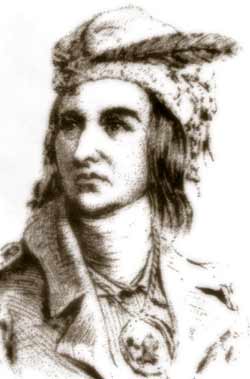
Ohio and the War of 1812
Before the official declaration of war in 1812 some Native Americans were increasing their attacks against the settlers coming into Ohio. In 1797 Revolutionary War general Anthony Wayne organized a campaign that crushed the Ohio Indians and they were forced into signing a treaty, although some of the Native Nations were not present and did not participate in this treaty. They outwardly rejected the Treaty of Green Ville. Despite this uneasy truce, a number of settlers began moving into Ohio and in 1803 Ohio was admitted to the Union as the 17th state.

After this a Shawnee leader that had a vision of a United Native Nations of American rose to prominence. His name was Tecumseh. He was a familiar personality in Ohio, even have regular meetings with Ohio's first governor. Tecumseh began organizing various Nations from Lake Erie south to the Gulf of Mexico. Although these efforts ultimately failed, Tecumseh did make overtures to the British Canadians that together they could defeat the Americans, in return Tecumseh would take back Ohio and the lands west.

Americans Declare War
Great Britain and France seem to have always been at war with each other. In the early 1800s with the Napoleonic Wars engulfing much of Europe, England, short on men, began stopping American ships and forcing the ship's crew into British service. This was known as "impressment" which forced men into serving on a British navy ship. By 1812, some 10,000 Americans had been impressed into British service.
American commercial ships were also being fired upon, boarded and sunk if it was suspected that the ship had been in contact with the French. After much discussion in the halls of Congress, President Madison declares war against Great Britain on June 18, 1812.
Although much planning had been made leading up that declaration, all of those plans went by the wayside within the first 6 months. American leadership was woefully unprepared to execute a war with one of the strongest military powers in the world. The war would be fought on all of America's borders, on land and sea. By the end of the war, heroes and future presidents would rise from the ranks; America would learn what it takes to fight as a nation, and from the rockets bursting in the harbor in Baltimore, a new national anthem would be born. Both sides of the war would declare victory, and in a sense both sides were victorious. Never again would the United States and Great Britain fight each other and in time, they would become steadfast allies.
<< Previous


